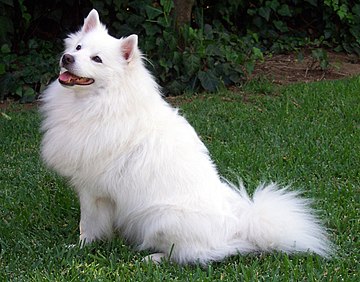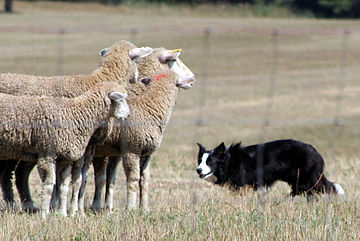Portal:Dogs/Selected picture
Usage
[edit]The layout design for these subpages is at Portal:Dogs/Selected picture/Layout.
- Add a new selected picture to the next available subpage.
- Update "max=" to new total for its {{Random portal component}} on the main page.
Selected pictures list
[edit]Portal:Dogs/Selected picture/1

The American Eskimo Dog is a breed of companion dog originating in the United States (probably in New York City) in the twentieth century. It is derived from the German Spitz, the Finnish Spitz, and almost certainly the Pomeranian and Keeshond. The spitz family of Nordic dogs is one of the least altered by human husbandry and reflects most nearly the prototypical dog, from which stock all others have been derived. Archeology suggests that Neolithic dogs living with humans would today pass for spitzes.
Portal:Dogs/Selected picture/2

The American Water Spaniel is a gundog breed of dog developed in the market hunting days of America's history. Hunters needed a dog that could function on land as well as in the marsh and that could easily fit into a canoe or skiff without taking up much room. An American original, this flushing spaniel also doubles as a competent retriever.
Portal:Dogs/Selected picture/3

A yellow Labrador Retriever correctly negotiating weave poles at a dog agility competition. Similar to a slalom, weave poles are a series of upright poles, each about 3 feet (1 m) tall and spaced about 20 inches (50 cm) apart, through which the dog weaves. It is one of the most difficult obstacles for a dog to master. It varies from 5 to 12 poles at one time. The dog must always enter with the first pole to his left and must not skip poles.
Portal:Dogs/Selected picture/4

A Border Collie herding sheep. Border Collies can take direction by voice and whistle at long distances when herding. Their great energy and herding instinct are still used to herd all kinds of animals, from the traditional sheep and cattle, free range poultry, and pigs, to deer and ostriches. They are also used to remove unwanted wild birds from airport runways, golf courses, and other public and private areas.
Portal:Dogs/Selected picture/5

A Standard Poodle in "working clip" retrieving a mallard. Retrievers were bred primarily to retrieve birds or other prey and return them to the hunter without damage. Although spaniels and some pointing breeds routinely retrieve game, and many retrievers are skilled in finding game, retrievers are distinguished in that non-slip retrieval is their primary function. As a result, retriever breeds are bred for soft mouths and a great willingness to please, learn, and obey. Poodles, though developed as hunting dogs, are most commonly used as companions.
Portal:Dogs/Selected picture/6

The naming of the modern American hot dog is supposedly influenced by the dachshund. In 1852, the butcher's guild in Frankfurt am Main created a smoked, spiced sausage in a thin casing, dubbed a "little-dog" or "dachshund sausage" for its obvious resemblance to the low-riding German dog. The popular legend on the etymology of hot dog holds that a cartoonist named Tad Dorgan attended a polo match in New York in 1901 where vendors roamed the aisles imploring patrons to "get your red-hot dachshund sausages." Enchanted, Dorgan drew a smiling dachshund nestled in a long bun, but couldn't spell dachshund, so he captioned it "hot dog!" and thus the food got its name.
Portal:Dogs/Selected picture/7

The Labrador Retriever ("Labrador" or "Lab" for short), is a retriever, and is the most popular breed of dog (by registered ownership) in the United States, Canada, and the United Kingdom. The breed is friendly, intelligent, energetic and good natured, making them excellent companions and working dogs. Labrador Retrievers are known to be one of the fastest-learning breeds of dog and respond well to praise and positive attention. The steady temperament of Labs and their ability to learn quickly make them an ideal breed for assistance dogs as well as search and rescue, detection, and therapy work.
Portal:Dogs/Selected picture/8

A Border Collie correctly maneouvring through weave poles in dog agility. Border Collies are an extremely intelligent breed with an instinctive desire to work. They are also extremely energetic and require a lot of attention, but are very responsive to training. They are better off in a household that can provide them with plenty of exercise and a job to do.
Portal:Dogs/Selected picture/9

A team of fourteen mixed-breed dogs mushing. Mushing is a general term for a sport or transport method powered by dogs, and includes carting, sled dog racing, skijoring, freighting, and weight pulling. More specifically, it implies the use of one or more dogs to pull a sled on snow. The term is thought to come from the French word marche, or go, run, the command to the team to commence pulling. "Mush!" is rarely used in modern parlance, however; "Hike!" is more common in English.
Portal:Dogs/Selected picture/10

A Komondor during the Working Group judging at the 2007 Westminster Kennel Club Dog Show. The Westminster Kennel Club Dog Show is a two-day benched conformation show that takes place at Madison Square Garden in New York City every year. Dog owners from around the world come to show their dogs. Dogs are judged closely by eminent American Kennel Club (AKC) judges. It is considered by many to be America's most prestigious dog show.
Portal:Dogs/Selected picture/11

Retrievers, such as this Labrador Retriever, are a type of gun dog bred to retrieve downed birds from water or land. Although spaniels and some pointing breeds routinely retrieve game, retrievers are skilled in finding game, and are distinguished in that non-slip retrieval is their primary function. As a result, retriever breeds are bred for "soft" mouths and a great willingness to please, learn, and obey. A soft mouth refers to the willingness of the dog to carry game without damaging it. Retrievers are often selected as family pets, and many suburban dogs end up retrieving newspapers and sticks like this dog.
Portal:Dogs/Selected picture/12

Purebred dogs, such as these Airedale Terriers, may participates in conformation dog shows with its owner or handler. Dog shows (and the related sport of Junior Handling for children and young people) are a popular activity; a single show, the 2006 Crufts dog show alone had 143,000 spectators, with 24,640 purebred dogs entered, representing 178 different breeds from 35 different countries.
Portal:Dogs/Selected picture/13 [[Image:|360px|center|]]
Portal:Dogs/Selected picture/14 [[Image:|360px|center|]]
Portal:Dogs/Selected picture/15 [[Image:|360px|center|]]
Portal:Dogs/Selected picture/16 [[Image:|360px|center|]]
Portal:Dogs/Selected picture/17 [[Image:|360px|center|]]
Portal:Dogs/Selected picture/18 [[Image:|360px|center|]]
Portal:Dogs/Selected picture/19 [[Image:|360px|center|]]
Portal:Dogs/Selected picture/20 [[Image:|360px|center|]]
Nominations
[edit]Feel free to add gallery pictures to the above list. Other pictures can be nominated here.
